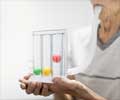German researchers say patients with moderate to severe chronic obstructive pulmonary disease (COPD) can benefit from triple therapy
German researchers say patients with moderate to severe chronic obstructive pulmonary disease (COPD) can benefit from triple therapy that includes a long-acting b-agonist (LABA), an inhaled corticosteroid (ICS) and an anti-muscarinic agent.
In the study, which will appear in the October 15 issue of the American Thoracic Society''s American Journal of Respiratory and Critical Care Medicine, researchers found that adding budesonide, an ICS, and formoterol, a LABA, to the anti-muscarinic agent, tiotropium, reduced the rate of severe exacerbations in COPD patients by 62 percent. Triple therapy also resulted in significant improvements on a number of outcome parameters in COPD patients, including lung function, signs and symptoms, and quality of life."This approach is of interest because the goal of COPD management is to achieve optimal control," wrote lead author, Prof. Tobias Welte, M.D., head of the Department of Respiratory Medicine of the Hannover Medical School in Germany.
While current guidelines suggest using both LABA and/or muscarinic antagonists and ICS in only a small number of patients, triple therapy is more widely used in clinical practice than officially recommended, but the benefits have never been demonstrated in a randomized controlled trial.
"We wanted to evaluate the effect of budesonide/formoterol combined with the tiotropium on lung function, patient-centered clinical outcomes (symptoms, health-related quality of life, exacerbations and morning activities), and tolerability in patients with COPD," said Dr. Welte.
The researchers recruited more than 600 patients with moderate to severe COPD to participate in the randomized, double-blind, multi-center, parallel group trial. Prior to the beginning of the study, enrolled patients stopped their use of LABA and ICS medications for two and four weeks respectively. Two weeks prior to the start of the trial, every patient was given a tiotropium (18 μg) inhaler to use daily and as needed as a reliever medication. Patients were then randomized to use either tiotropium plus budesonide and formoterol or tiotropium plus placebo twice daily. They were assessed at the beginning of the run-in period, then at weeks zero, one, six and 12.
After one week, patients on triple therapy increased their pre-dose FEV1 clinic values by six percent over than patients on tritropium alone. There was an even greater improvement in post-dose readings among triple-therapy patients, which were about 12 percent better than those on tiotropium alone.
Advertisement
Health status in the triple therapy group, as measured by the St. George''s Respiratory Questionnaire for COPD (SGRQ-C) improved on average by 3.8 units. While four points is considered the minimum clinically relevant increment in most studies, more than half of triple therapy patients, as compared to 40 percent of placebo patients, experienced the clinically significant four-point-or-greater increase in SGRQ-C scores.
Advertisement
But perhaps most significantly, the triple therapy treatment group had fewer than half the severe exacerbations of the placebo group. In the triple therapy group, 7.6 percent experienced severe exacerbations, compared to 18.5 percent in the placebo group. Those in the triple therapy treatment group also had fewer hospitalizations and a longer time to hospitalization than the placebo group.
"This is the first clinical study to directly evaluate the clinical efficacy of combining budesonide/formoterol with tiotropium in patients with COPD," said Dr. Welte. "This treatment approach was associated with marked improvements in various assessments at the clinic and at home in the morning compared with tiotropium alone. In addition, a significant 62-percent reduction was seen in severe exacerbations. Future research will evaluate the differences between triple and double (formoterol/tiotropium) therapy, may use longer study periods, and-in basic research experiments-will try to explain why the triple therapy is so successful."
Source-Newswise
RAS















